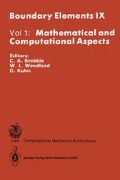Abstract
Many problems in physical science and engineering technology can be formulated as boundary value problems of partial differential equations in domain, and many boundary value problems usually can be reduced into integral equations on the boundary through different ways. Based on these boundary reductions and the classical finite element methods, in recent years boundary element methods hays been ikveloped by many authors (Hsiao and Wendland13; Feng10; Brebbia8; Nedelecl15). At the same time, adaptive finite element methods have been developed (Babuška et al4; Oden et al16). These methods utilize the currently available information for steering the computational process. According to a-posteriori error estimate of approximate solution, the mesh or approximation structure is automatically changed so as to improve the quality of numerical solutions. The aim of these estimates is not only to measure the size of the error but also to give an idea of the error distribution over the mesh. Most a-posteriori error estimates for finite element methods use the residual of the approximate solution. Another is obtained from higher order derivatives of the unknown solution through a currently available finite element solution.
Access this chapter
Tax calculation will be finalised at checkout
Purchases are for personal use only
Preview
Unable to display preview. Download preview PDF.
References
Adams,R.A. (1975). Soholev Snaces, Academic Press, New York.
Arnold,D. and Wendland,W.L. (1983). On the asymptotic convergence of collocation methods, Math. Comp. 41, pp. 349–381.
Arnold,D. and Wendland,W.L. (1985). The convergence of spline collocation for strongly elliptic equations on curves, Numer. Math. 47, np. 317–341.
Babuska,I. and Miller,A. (1981). A-posteriori error estimates and adaptive techniques for the finite element method, Technical Note RN-968, IPST University of Maryland.
Babuska,I. and Miller,A. (1984). A feedback finite element method with a posteriori error estimation, Part I, Technical Note BN-1031, IPST University of Maryland.
Babuska,I. and Yu,Dehao (1986). Asymptotically exact a-posteriori error estimator for biquadratic elements, Technical Note RN-1050, IPST University of Maryland.
Babuska,I. and Yu,Dehao. A-posteriori error estimation for biquadratic elements and adaptive approaches, to appear.
Brebbia,C.A. (Ed.) (1978). Recent Advances in Boundary Element Methods, London.
Costabel,M, and Wendland,W.L. (1985). Strong ellipticity of boundary integral operators, Preprint-Nr. 889, Fachbereich Mathematik, Technische Hochschule Darmstadt.
Feng,Kang (1980). Differential vs. integral equations and finite vs. infinite elements, Math. Numer. Sinica, 2, pp 100–105.
Feng,Kang and Yu,Dehao (1983). Canonical inteoral equations of elliptic boundary value problems and their numerical solutions, in Proc. China-France Symp. on the Finite Element Method, April 1982, (Ed. Fenn Kann and Lions,J.L.) Beijing, nn211–252.
Feng,Kang (1983). Finite element method and natural boundary reduction, in Proc. Intern. Congress Math. August 1983, Warsaw, np1439–1453.
Hsiao,G.C. and Wendland,W.L. (1977). A finite element method for some integral equations of the first kind, J. Math. Anal. Appl. 58, pp 449–481.
Lions,J.L. and Maoenes,E. (1972). Non-Homoneneous Boundary Value Problems and Applications, I. Springer-Verlag, Berlin-Heidelberg-New York.
Nedelec,J.C. (1977). Approximation des equations integrales en mecanique et en physique, Lecture Notes, Centre de Mathematiques Apoliquees, Ecole Polytechnique, Palaiseau.
Oden,J.T. Demkowicz,L. Stroulis,T. and Devloo,P. (1986). Adaptive methods for problems in solid and fluid mechanics, in Accuracy Estimates and Adaptive Refinements in Finite Element Computations, (Ed. Babuska,I. Zienkiewicz,O.C. Gano,J. and Oliveira,E.R.de A.) John Wiley & Sons Ltd.
Rank,E. (1984). A-posteriori error estimates and adaptive refinement for some boundary element methods, in Proceedings of the ARFEC-Conference, Lisbon.
Rank,E. (1986). Adaptivity and accuracy estimation for finite element and boundary integral elenent methods, in Accuracy Estimates and Adaptive Refinements in Finite Element Computations, (Ed. Babuska,I. Zienkiewicz,O.C. Gano,J. and Oliveira, E.R.de A.) John Wilei & Sons Ltd.
Wendland,W.L. (1983). Boundary element methods and their asymptotic convergence, in Filioni,P. Theoretical Acoustics and Numerical Techniques, CISM Courses and Lectures 277, Snringer-Verlag, Wien, New York, oo135–216.
Wendland,W.L. (1979). Elliptic Systems in the Plane, Pitman, London, San Francisco.
Wendland,W.L. (1985). On some mathematical aspects of boundary element methods for elliptic problems, in Whiteman,J.R. The Mathematics of Finite Elements and Applications V, Academic Press, London.
Yu,Dehao (1982). Canonical integral equations of biharmonic elliptic boundary value problems, Math. Numer. Sinica, 4: 3, pp 330–336.
Yu,Dehao (1983). Numerical solutions of harmonic and biharmonic canonical integral equations in interior or exterior circular domains, J. Comn. Math. 1: 1, pp 52–62.
Yu,Dehao (1983). Coupling canonical boundary element method with FEM to solve harmonic problem over cracked domain, J. Comp. Math. 1:3, nn195–202.
Yu,Dehao (1984). Canonical boundary element method for plane elasticity problems, J. Comp. math. 2: 2, pp 180–189.
Yu,Dehao (1985). Canonical intenral equations of Stokes problem, J. Comp. Math. 4:1, on62–73.
Yu,Dehao (1985). Error estimates for canonical boundary element method, in Proc. Fifth Inter. Symp. on Differential Geometry and Differential Equations, Aunust 1944, (Fd. Feng Kang) Science Press, Beijing.
Yu,Dehao (1987). Self-adaptive boundary element methods, Wissenschaftliche Jahrestagung, Gesellschaft für Angewandte Mathematik and Mechanik, April 1987, Stuttgart.
Author information
Authors and Affiliations
Editor information
Rights and permissions
Copyright information
© 1987 Springer-Verlag Berlin Heidelberg
About this paper
Cite this paper
Yu, Dh. (1987). A-Posteriori Error Estimates and Adaptive Approaches for some Boundary Element Methods. In: Brebbia, C.A., Wendland, W.L., Kuhn, G. (eds) Mathematical and Computational Aspects. Boundary Elements IX, vol 9/1. Springer, Berlin, Heidelberg. https://doi.org/10.1007/978-3-662-21908-9_16
Download citation
DOI: https://doi.org/10.1007/978-3-662-21908-9_16
Publisher Name: Springer, Berlin, Heidelberg
Print ISBN: 978-3-662-21910-2
Online ISBN: 978-3-662-21908-9
eBook Packages: Springer Book Archive

